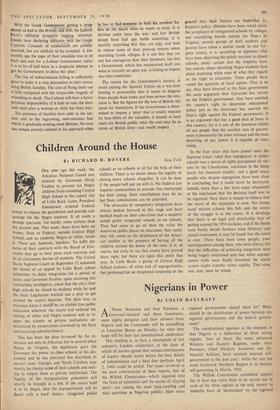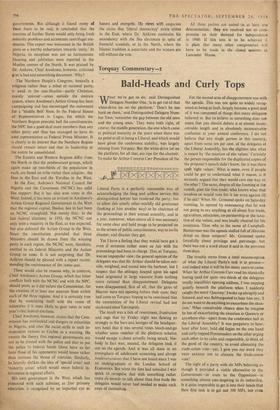Nigerians in Power
By COLIN HAYCRAFT
APRIME MINISTER and four Premiers, a Governor-General and three Governors, some eighty delegates and their advisers from Nigeria and the Cameroons will be assembling at Lancaster House on Monday for what they hope will be their last constitutional conference.
This meeting is, in fact, a resumption of last summer's London conference, at the close of which all parties agreed that various commissions of inquiry should report before the final details of independence and a final date (perhaps April 2, 1960) could be settled. The issues involved in the most controversial of these reports, that of the Willink Commission—which inquired into 'the fears of minorities and the means of allaying them'—are among the most long-standing and, vital questions in Nigerian politics. How many regional governments should there be? What should be the distribution of power between the regiorial governments and the federal govern- ment?
The constitutional position at the moment is that Nigeria is a federation of three strong regions. Two of them, 'the more advanced Western and Eastern Regions, under their Premiers, Chief Obafemi AwolOwo and Dr. Nnamdi Azikiwe, have attained internal self- government in the past year : while the vast but more backward Northern Region is to become self-governing in March, 1959.
The Willink Commission considered appeals for at least one extra State to be carved out of each of the three regions as the only answer to minority fears of 'domination' by the regional governments. But although it found many d these fears. to be real, it concluded that the creation of further States would only bring fresh minority problems and accentuate centrifugal ten- dencies. This report was welcomed in the British press as a worthy exhortation towards 'unity.' In Nigeria, its reception was not so harmonious. Dancing and jubilation were reported in the Muslim centres of the North. It was praised by Dr. Azikiwe. Chief Awolowo, however, criticised lit as 'a bad and astonishing document.' Why?
The Northern People's Congress, basically a religious rather than a tribal or national party, is weak in the non-Muslim—partly Christian, mainly 'animist'—areas outside the emirate system, where Awolowo's Action Group has been campaigning and has encouraged the movement for a 'Middle Belt' State. In the Federal House of Representatives in Lagos, for which the Northern Region provides half the constituencies, the NPC has a good deal more members than any other party and thus has managed to have its own representative as Federal Prime Minister. It is clearly in its interest that the Northern Region should remain intact and that its leadership at the centre be consolidated.
The Eastern and Western Regions differ from the North in that the predominant groups, which again make up two-thirds of the population in each, are based on tribe rather than religion : the Ibos in the East and the Yorubas in the West.
In the East, Azikiwe's National Council for Nigeria and the Cameroons (NCNC) has solid lbo support. But it has also won votes in the West. Indeed, it has been an irritant to Awolowo's Action Group Regional Government in the. West that the regional capital, Ibadan, has in fact been an NCNC stronghold. Not merely that : in the last federal elections, in 1954, the NCNC not only won a majority in the East, as was expected, but also defeated the Action Group in the West. Since the constitution provided that three Ministers should be drawn from the winning party in each region, the NCNC were, therefore, entitled to six federal Ministers and the Action Group to none. It is not surprising that Dr. Azikiwe should be pleased with a report recom- mending the maintenance of the status quo.
These would also be reasons why, in contrast, Chief Awolowo's Action Group, which has bitter conflicts both with the NCNC and with the NPC, should press, as it did before the Commission, for the creation of at least one separate State within each of the three regions. And it is certainly true that by associating itself with the cause of minorities it is most likely to gain votes in next year's vital federal elections.
Chief Awolowo, however, claims that the Com- mission has overlooked real dangers to minorities in Nigeria, and cites the racial strife in such in- dependent nations as Ceylon as a warning. He resents the theory that regional governments are not to be trusted with the police and that to put the police in federal hands (these have so far been those of his opponents) would lessen rather than increase the threat of coercion. Similarly, he heartily dislikes the idea of 'special areas' and minority areas' which would mean federal in- tervention in regional affairs.
His own government in the West, which has pioneered with such schemes, as free primary education, is recognised by an impartial eye as honest and energetic. He views with suspicion the claim that 'liberal democracy' exists either in the East, where Dr. Azikiwe maintains his ascendancy with the Ibo electorate in spite of financial scandals, or in the North, where the Islamic tradition is autocratic and the women are still without the vote. All three parties are united in at least one determination: they are resolved not to corn- promise on their demand for independence in 1960. If this aim is to be achieved it is plain that many other compromises will have to be made in the closed sessions at Lancaster House.



































 Previous page
Previous page